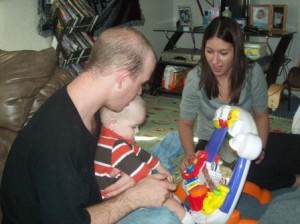When you walk in the door to a family’s home, who is the focus of your visit? Who are you there to work with?
These might seem like two very straight-forward questions, but think about them for a moment. The early intervention world revolves around the infant or toddler with the developmental delay or disability, the little person who is the reason for the visit. Yet, we know  that we should focus on supporting the parent as he or she interacts with the child during the visit to be most effective. Thinking about ourselves as coaches and consultant for parents as opposed to teachers and therapists for babies is a significant shift for many EI providers. Making this shift is important because the EI literature points to parent support as our most valuable tool in enhancing the development and participant of infants and toddlers. Okay, so then how do you support parents beyond asking “how’d the week go?”
that we should focus on supporting the parent as he or she interacts with the child during the visit to be most effective. Thinking about ourselves as coaches and consultant for parents as opposed to teachers and therapists for babies is a significant shift for many EI providers. Making this shift is important because the EI literature points to parent support as our most valuable tool in enhancing the development and participant of infants and toddlers. Okay, so then how do you support parents beyond asking “how’d the week go?”
Focusing on the ADULT learner during the visit is something that many of us in EI weren’t really trained to do. Integrating adult learning into your visit will go a long way towards positive outcomes for the child and family. Here are a few ways to use adult learning principles during your visits:
Adults Learn Through Active Hands-On Experiences
Adults learn through doing much better than through listening and observing. Focus on engaging the parent and joining her as she interacts with her child. Think about working as a triad, where the child and parent interact and you support that interaction. When parents are passively observing your interactions with the child, they won’t be learning nearly as much as they would if you were coaching them while they interact with their child.
Adults need Learning to be Relevant and Immediately Useful
Adults are motivated when they learn strategies that are relevant to their current and past experiences and immediately useful to their life, which is why building intervention on family priorities is so important.
Adults need Learning to Relate to What They Already Know
Adults also need to know how the new information relates to what they already know. Ask good questions before jumping into intervention. Find out what the parent has already tried and build from there. This type of reflection also helps parents learn to pull from their own experiences in the future to solve problems when you aren’t present to provide support.
Adults Learn through Practice and Feedback
Adults need to practice what they are learning and receive feedback to help them know if they are on the right track. Reflect together on how the parent-child interaction went. Don’t just give feedback; invite the parent to reflect too. Problem-solve together to overcome struggles and plan for how the parent will use strategies during other routines. Parents have reported in the literature that joint problem-solving is one of the biggest benefits of early intervention. Working together to develop strategies and plan for their use rather than prescribing activities for the parent and child to do will result in much better outcomes all around.
You are more than a teacher or therapist who works with babies. You are a coach and consultant to parents. What you do can make a difference in the relationship between the parent and child that stretches much farther than the brief time families are in EI. Spend some time focusing on adult learning as a means of supporting child development and you’ll be amazed at the impact you can have during and beyond your visits!
What strategies do you use during visits to support the parent’s learning? How might you weave one of these adult learning strategies into your next visit?


